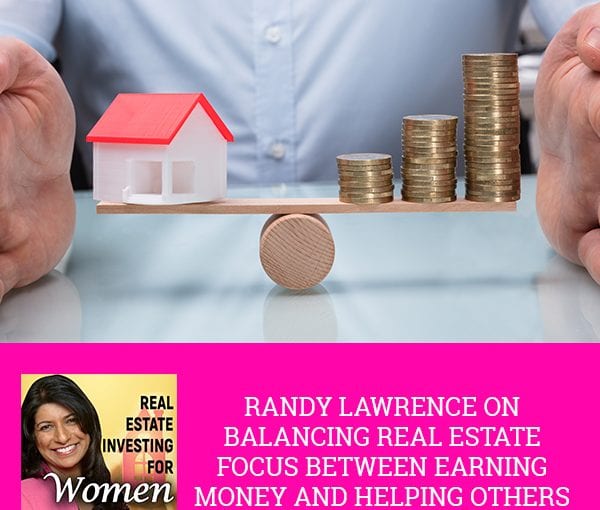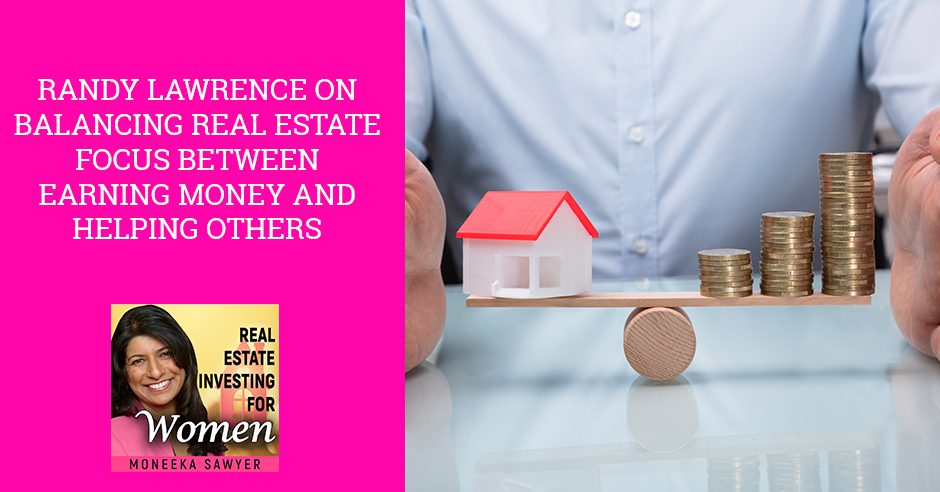I am so excited to welcome to the show, Randy Lawrence, who is known as The Real Estate Preacher. Success as a Financial Advisor and Wealth Manager wasn’t enough for Randy Lawrence in 2003. He knew there was a better way to build wealth and was determined to find it for himself and his family, and that’s what led him to real estate. He has been operating as an investor since 2003. He has had double-digit real estate investor returns with no loss of capital for seventeen years. He has single-family houses and has flipped 75 homes a year. He has over $100 million in ownership and management of apartment complexes and he has a Bachelor’s in Finance and a minor in Economics. How are you, Randy?
It’s awesome to be connected together on the show. I’m so excited about being a blessing to all of your readers.
Give us the two-minute high level story of what got you into real estate and what ignited your passion for it?
My degree is in Finance Economics. I knew at eighteen or whatever, the movie Wall Street was out and I’m going to be a stockbroker and all that back then. I got my degree in Finance and became a stockbroker. I opened my company. I was a money manager and registered investment advisor. I bought my first multifamily, a little small duplex in ‘99 and saw the power of what real estate could do in terms of the consistency of the return. The beta adjusted return or risk adjusted return, comparative to what we were doing in these stock portfolios compared to what I was getting in this real estate.
It began to set that in motion like, “This is benefiting me so much. I want to be able to benefit my clients,” because stock market regardless of how good you are, there’s the up and down. In 2003, we started the private equity company and started focusing on purchasing apartments and single-family homes, working together to help other investors be able to leverage that. We sold our money management company in 2006 and 2003, as I said, started our real estate investing career and journey and helping others as well.
Is that your main focus? You don’t do any of the money management stuff anymore?
No. There was a bit of time where it overlapped from ‘03 to ‘06 and then ‘06, I sold my company to some other advisors that we were partnered together with, and they took over the practice and the management of the clients. A number of those clients came with me as well, also at the same time, some people were conditioned for stocks and bonds. We began focusing on preaching that message, if you will, hence the real estate preacher of what real estate can do for your financial life. Other investors started coming and investing with us either in the small apartment buildings or in the houses. From that period of time to now, I probably flipped a thousand houses. We still have a residential division that buy, fix and sell, about 75 houses a year. Our main focus is in the large-scale multifamily. We have now about 135 million, roughly fifteen apartment complexes, large-scale 75-unit to 200-unit apartment complexes. That continues to be our focus going forward as we scale and grow the company.
It is interesting to me that you moved from financial planner to real estate instead of integrating the two, which indicates your passion for real estate. I’ve seen a lot of people that try to marry them. They feel like the real wealth planning is as a financial planner, and real estate is this other thing. I’m like you, it’s all about the real estate. That’s where the real money is.
One of the things you touched on in the bio, genuinely we’ve had seventeen years with all our private capital individuals. I’ve never lost any money and made double-digit returns. I could not say that as a wealth money manager in the stock arena because the truth is you have the tech crash in ‘99. People lost money in their portfolio. There were other recessions that we went through. That’s the nature of the stock market investment. You’re going to balance it out, “This year is up 30%, this year it’s down 15%.” That’s a difficult thing. Even though I understand that, not everybody can tolerate that. Plenty of people when they’re down 20%, they couldn’t stomach it anymore. They’ve got to sell to assuage that difficulties and they’re locked in that loss. It was something I saw the benefits of the real estate is you have such greater stability and greater return, and you don’t have that massive volatility that you have and you still have the ability to get those double digit returns. When I looked at that I’m like, “Hands down, this is the way for my family and me, no doubt, to create wealth for our family.” It’s the best way to do that for others.
When you talk about double digit returns, I know I’m totally skipping the gun. What kinds of returns are you guys looking at? We’ll talk more about how he does it. I’m curious.
Anywhere from 10% to 14% and then consistently over the seventeen years, 12% as a consistent return. Even some of our growth-oriented projects we do probably are sixteen-plus type return. For the longer term history, it’s right there 12%. What I’ve learned is consistency is what’s sexy. Sometimes people are, “There’s 20% thing. It’s up, it’s down.” The real pathway to generating long-term wealth is to consistently make money, keep the money that you have, consistently grow it well and that’s generational wealth that you accumulate.
That’s funny the way that you said that. There have been many people on this show that talk about, “Make money fast. You buy foreclosures, do this, do that.” There have not been that many on this show, but I hear it all around, “Do your flips. Become a wholesale or do all these things.” It’s a glorified job, but it’s sexy because it’s money that happens fast. My strategy of buy, hold, wait, have good tenants, keep them up, build equity, build cashflow, it doesn’t sound that sexy because it takes time.
The reality is you can jump to every other opportunity out there. There’s one that will perform consistently. That’s looking at real estate, whether you’re doing syndication, a part of your multi-unit, single-family homes, mobile home parks, whatever it is you’re doing, have the long-term vision to hold on and stay in the game. There will be times when it goes down, but it’s not going to go down like the stock market does. There’s usually going to be a recovery, give yourself the time to be right and to benefit.
That’s the thing you nailed too. By having quality cashflowing real estate type investments, that if there is a period where it’s a little bit on a down slope, whether it’s in the economy or that particular area, that consistency of the cashflow helps to continue to support through that period of time as you navigate through it. There are many benefits to real estate that are not imbued to other investments. I talk to people, “I’m the turtle of the tortoise and the hare.” The turtle won the race by consistency. Jack rabbit jumped around here and there, doing this, doing that. At the end of the story, he lost the race.
When I go back to what has been one of our keys to the success over that period of time is that discipline. We’ve been super disciplined and very focused. It’s not like, “This year we’re doing a ground up construction in Vegas. Next year, I’m doing storage in Europe. Next year, I’m doing condos in Belize.” That’s not it at all. We’re focused, very clear about what we’re going to do. To some people, they go, “That’s boring.” Making real money and accumulating real wealth has a boring component to it because you’re doing this same thing over and over consistently. It’s about the result. I know you preach about what the lifestyle can be, the blissful element of what you’re able to achieve. That’s what got to be a driver for people in their decision-making process.
It is boring. If you want exciting, go to the stock market. Leave us 50% at the beginning of the year. If that’s what you want to do, go do that.
Go skydiving for the adventure but keep your money growing great.
You talked about discipline as being one of the keys to success. What are the other ones?

Real Estate Focus: Even if you don’t have that massive volatility, you can still get those double-digit returns.
The other one is critical. It’s not only the discipline, but then the focus. I love the fact too with the readers being able to partake of your wisdom and then even in the inner circle to learn more as well too, is that you can hear what different people are doing and saying, “I see that this area is the right area for me.” For us, it’s mutifamily apartment complexes. That’s the thing that we’ve developed in a very niche focus, even within with workforce housing, for regular working Americans. With that focus, we’ve been able to identify exactly what works well, what the systems are, the economics behind it. Now, it gives us liberation or freedom to skew these one-off opportunities that don’t fit in there.
Somebody calls me up, “I got this incredible ground-up project in Vegas. You should partner with us and do it.” The truth is that would suck me into a black hole of doing all this stuff over here that’s not within our focus. It doesn’t mean people don’t make money in that arena. It doesn’t mean that may not be something in the future we would develop as a whole division with the right resources, but it’s not within our focus. That’s where with the focus we’re able to scale. That’s such a thing that people miss out on because you alluded to it in an earlier comment where people are like, “I’m going to do the flipping. I’m going to do the wholesaling. I’m going to do this. They’re doing lease options. That sounds great.” You become a Jack of all trades and a master of none.
I sent out an email that was, “You’re going to make mistakes. Things are going to get hard at some point,” because usually in the very beginning, that’s where your learning curve is. Every single time if things get hard, that’s when you jump, you never ever get to see success. The truth is it will always be hard in the beginning. Even if it’s an easy strategy, buy a house, put a renter in, wait for twenty years. In the beginning, you’re going to be like, “There are these contracts. I have to make decisions on contingencies. Do I buy a pretty house or do I buy what I’m going to fix up?” There are still decisions. It’s never as easy as somebody who’s successful tells you it is, because they’re excited about their success.
They’re not focusing on what didn’t work. They’re focusing on what they’re successful at. When you get in there, now you get to determine, you get to see what it’s like to be in the mud to be doing the work. It’s never a cakewalk in the beginning. Choose something that is aligned with you and your goals. We’ve talked about that too, aligned with your goals, aligned with who you are, how much money you want to make and how much time you’ve got to make it. Do you want to cashflow or appreciation? Do you want to be hands on? Do you want to do syndication? What is it? Stick with it. Over the long run, there are a million ways to make $1 million in real estate. We don’t have to pick exactly the right one.
That’s the thing too that you said that’s right on is I talk to people about that, even investors that invest with us like, “You have to come to what’s true for you. You have to do what’s in alignment for you and then be okay with that.” It may not be that everybody’s cup of tea is to have ownership of twenty houses that they’re managing themselves. I know friends that have 800 houses. Everybody has got a different temperament, everybody has got a different aptitude, a different core that works well for them. That’s what you got to see, what’s the right thing and that’s going to help you because you’re going to have to stay with it. That’s the key. I remember in 2008, people in real estate, they were gone. The market crashed.
In Florida where I’m at, it dropped 50%. It was a ghost town and other people that were investors instead of fighting through those things fled and went back to that work for Bank of America. “Real estate is getting better in 2013. I’m going to come back.” You missed the goal. The goal was working through the difficulties. Quite frankly, that’s what also helped us to become super strategic. Having to go through those fires created a refinement in us so that we were very laser-focused on being strategic from mistakes that you’re learning from in the middle of that, to then now be hyper-intensely focused, being strategic about looking ahead, multiple years out in the decisions you make how that plays out down the road. The people that jumped out because it was too difficult, they missed out on that gold. That’s why we are where we are at and where they’re at.
Randy, I love the way you talked about that whole crash. I’ve heard on this show that anybody who says they didn’t lose money in 2008 are lying. I know that I did not lose any money. I ended up making $1 million within five years. What that had to do was not that I’m brilliant, but that I had the long-term vision. I didn’t foresee this and I made bad choices but I had a very core strategy, which was I needed to never be so leveraged that I couldn’t cover my mortgages either with my reserve funds or with my rents. It’s super simple things. What happened for me too is in 2008, when our properties are all lost 50% and at least the mortgages were being covered by my renters, it didn’t make me take a look at even me, “What is my vision of my business?”
Getting strategic, taking a look at the thing that we didn’t think would ever happen in California happened. Many of my friends lost their shirts. It was horrible. That’s not what happened to us. We’re lucky, but we were also very strategic and have become more so. I love that you talk about that even with multifamily. Could you tell us about what did you learn? What were those pieces that you took out of that?
The number one thing I would say is strategic in decision-making because there are some of the things ahead of that where we are located in Pinellas County, which is the Tampa Bay, MSA of Florida, super white hot real estate market at the time. Quite honestly, we were buying properties as to where you could get them. It was hard to get them. You get what you get and don’t throw a fit. When the crash came and the meltdown came and again, there were a lot of things, whole neighborhoods went ghost with foreclosures. We even saw in some of our lower-end apartment complexes in D area, smaller places, the rents dropped almost in half because people were almost given houses away to rent them to fill them back up.
It showed me the lack of clarity that some of the decisions were made in the earlier years, say maybe in ‘05 and ‘06, that then were difficult now in ‘08, ‘09 that I had to work through. Working through those difficulties, it made me see the power of being strategic and understanding the way I’m making this decisions now. What are those ramifications as to what it looks like 3, 5, 10 years from now, and then making sure that they’re aligned. In fact, what we do now is we work mostly backwards, where I want to be, where my firm wants to be 5, 10 years from now. We just went through a thing where we are working out 30 years from now. When we talked about Tahoe before the show, I can see myself at 85 in my office, overlooking Tahoe in my home as the chairman, talking to the CEO. I’m mapping out those plans now for that, which is 35 years from now.
Being strategic now, that’s very dry, not exciting for a lot of people because it includes being pragmatic, where you’re not emotionally driven by it, but you’re looking at more of a factual thing. It’s more of a calculated focus decision-making. That would probably be the number one thing. The number two thing is being in the right areas. Even now, we skewed a purchase in one of the areas we’re in because the pocket it was in on a dead end street was surrounded by some other unwell run complexes that had suffered in the last downturn and still hadn’t got back significantly.
What that made us think about is, “If we have a little bit more economic softening, you’ve got two other properties dragging this thing down and you’re on a dead end cul-de-sac with other lackluster properties in an area that’s not as desirable. You’re fighting against the stream. No, thanks. We’ll pass.” We had that from the experience of 2008, where some of the properties that were in less desirable areas, they were good cashflow before but not when it went bad.
Being very focused on what is the right area, what are the things around you that make it a good area? You don’t have to be in an A-class area to be a good area, but you have to have good drivers. You’ve got to have good quality people. You’ve got to have good economics for jobs. There have got to be positive things that exist there so that when economics have a little bit of a struggle, your area is still weathering that well and your investments are doing well.
I loved the way you said about going downstream or going upstream. You talked about a stream. For me, one of the things that I always tell people is never be the nicest house on a block, never be the nicest building on a block. You want to make sure that you’re in the flow and that you’re not pulling it down or pulling it up. Because if you’re pulling it up, that means others are pulling you down.
You nailed it on your houses you alluded to is the underwriting is critical. You made sure that your debt was going to be supported. One of our principles that we operate by in our underwriting of investment complexes is we’re never the pioneer, always the settler. If we have to say, “We’re going to be the first one in the marketplace to charge $1,200 rent.” That’s not the place we’re buying. We want to be that there are three competitors offering $1,200 rent. Our rent is $975. We’re going to renovate the place and now offer our rent at $1,150. We’re a little cheaper than them or just as nice if not nicer because it’s brand new renovations and we’re not leading. We’re cleaning up behind them because we’re offering a better product at a better price. What I believe is also better management with better focus on benefiting our tenants.
I run my business the exact same way. It’s good to hear somebody else doing the same thing. They’re fully remodeled, absolutely stunning. I’m always in the middle of the range of what I could charge for that. I’m always a little bit cheaper from a much nicer place. We have all the other core values as you too is putting a good home, making sure that the tenants are happy, management has done well and all of those things.
I was talking with another person about this. It’s the thing that a lot of people learned in Sunday school as a kid. They’re the principle of, “Give and it’s given to you.” A lot of times, if we’re honest as a human being, we’re a little selfish. We want to take care of ourselves first. The funny thing about it is the principle is true. If you will give to help the other human beings, then God, the universe, however you want to put that together, it comes back to you and you receive it. The amount that you have actually grows.
Even for me, when I was a stockbroker and a young guy at eighteen, I wanted to become a stockbroker because Gordon Gekko and stockbroker and making money is like, “What better place to make money than where the money is?” As I matured and grew, it became less about me making money and more about, “What can I do that’s going to benefit other people?” Think and Grow Rich, Napoleon Hill talks about that as well. That’s a key component is serving others will now then begin to enrich you. That’s the truth. It takes us a while to get there. At least, it took me.

Real Estate Focus: Having a consistent cash flow can help support you through a period of time navigating in the real estate industry.
It takes a level of maturity for sure on that. In real estate, the numbers have to work but you don’t have to nickel and dime them to work. In other words, you don’t need to charge $1,250. You can charge $1,175. As long as the numbers still work, you’re going to do better because your renters will stay longer. Everybody is going to be happier. This is the thing that happens so much in real estate investing when you’re talking about flipping and wholesaling and these other things that we do. Your margins are so tight that you have to pay attention to those nickels and dimes. I much prefer to run a business that’s about giving, expansion and creating good things for our communities and for our renters. It’s a very different mindset.
This then goes back to the underwriting that you started off with too. If you fudge your numbers and people do this all the time, where they try to make the deal work. They push the limit of the numbers or everything’s got to be exactly perfect, razor-sharp perfect for it to work. What happens is they do it, they buy it and then 6 months, 12 months in they’re experiencing these problems. They’ve got to be pushed to the thread to try to make it all work. That goes back to me having an experience in 2008 and going through that fire, I learned it a long time ago. I’d rather not buy a deal than have to pay for it three years from now with all headaches and problems.
That’s where sticking to your core, criteria and value or however you want to put it to make sure your numbers work. If it’s a deal that doesn’t work, it’s not a deal. You move on through it. We’ve created an entire system where we have an underwriting system where every week I get a two-page 11×14 sheet with our team meeting at one of our acquisition underwriting people. We’re underwriting a bunch of properties to filter through which ones are no good which one trickle up to meet our criteria. We’re able to then hone into those top 2 or 3 that fit our criteria and then see out of those three, “This one looks like it’s going to work for us.” It’s a lot of work. There’s no success I’ve ever seen that doesn’t entail that discipline in work.
There’s a lot of focus with you and your company with helping to create a better life for working class Americans through apartments. You do syndications of apartments. Your whole focus is about benefiting the tenants lives, benefiting the investors and of course benefiting your company. There’s a win-win-win. You came to me as a referral from someone I very much respect, I know that’s not lip service. That’s something that you live by. There’s Twelve Tenets of Bliss and one of them is giving back. Feeling blessed for what we have and then giving back and sharing that with the world. I know that’s where you come from too. Could you talk about that?
We’ve started our initiatives. Premise number one is it’s got to be financially sound complex, for sure. You can’t benefit others if you’re not on stable ground. It’s got to be a solid investment, but we go in and we’re now transforming the community to make it a better quality of life physically. We’re making the exterior appear better, be nicer. We’re transitioning out, some of the tenants that don’t fit that model because we’re inheriting some of them that maybe are not quality disciplined, hardworking people. We’re transitioning them out, get the bad apples that may ruin the bunch so to speak. We’re then also renovating and transforming the insidesto have a new, nice quality apartment.
From there, we’re also implementing standardswith our management team and our maintenance where we want maintenance items addressed within 24 hours. It’s maybe a small thing. Parts got to be ordered, but they’re still being addressed in 24 hours so that this person knows they’re being taken care of. It’s fixed, three days later when the part comes in, but that’s a requirement and a KPI that we put in place to monitor for our management team and to see how they’re doing on that. What we’ve also done is to do community initiatives.
In 2021, we’re rolling out on a national basis with one of our internal team members to have a KPI, the eyes as probably a third of their job is making sure these projects and these programs are happening at every complex. What that is, we are doing a back to school drive for the complexes and empowering them, partnering together with oftentimes local faith-based organizations or community-based organizations. We’re providing these back to school backpacks, but also connecting them together for those that want with additional resources of people that can be helped to them in the community.
Also doing a Mother’s Day thing, where we go to all of the single moms in the community. We deliver to them flowers and a Starbucks gift card recognizing, “You’re making a sacrifice as a single mom. We appreciate and respect that and want to bless you and encourage you.” A lot of times, that’s a thankless job and something that simple goes a long way. The other thing is doing a spring or summer festival there at the complex with hot dogs, cookout and celebration and community feel. All of it is design to impart to the residents.
We’re also working with another organization, non-profit organization to develop a financial literacy program to help them develop financial acumen. I’ve got another couple of friends of mine that have done entrepreneur-based programs. That’s a second generation that this is all of it’s free. If you’re living in our complex, it’s free. If you want to learn how to better manage your money, you can go through this course to learn how to better manage your money. If you have a desire to become entrepreneur, here are some principles through this entrepreneurial track. I’d love to get the development of a real estate program too, to teach, whether it’s wholesaling. There are several other educator people I know as well that in that space, but that’ll be another track.
The design of it is to help prosper their life. First, their own wellbeing living in the complex. Secondly, their financial ability to manage their affairs better. Third, a spiritual connection. If that’s something that’s desired and fourth, a greater sense of community in where they live. We’re excited. We’ve done it at numerous complexes, but the exciting thing is as part of someone’s job within our company, that’s going to be 1/3 to 50% of their job role full-time is ensuring that these programs are carried out at every complex. Reporting back as part of their regular monthly, quarterly KPIs.
I’ve never heard of anybody that does that.
I came from a broken home, single-parent, predominant, upbringing and didn’t have any money. Powdered milk was I thought was what milk was until I went to a friend’s house and realized, “There’s real milk.” I recognize that many of the people that live in our complexes that are regular working Americans making $30,000 to $60,000 a year. A lot of those folks are going to be permanent renters for life based on where they’re at. Our goal and desire is to help them to have a better quality of life. The by-product of this and it goes back to what we said about the give and it’s given to you, is that there’s going to bemore stickiness in the community, less turnover. Any number of economic benefits of will come from that but our primary motivation is to genuinely benefit those people’s lives. Most people, if we’re honest about it, they don’t care about it other than what is the financial metric.
They’re like, “I don’t give a crap about that. What’s my return? What’s my money?” That’s not where we’re coming from. I believe that also generates even what will be a greater success than what we’ve already achieved because that’s our mission and our intent. I think the second driver of that is the empowering our investors. That came in 2015. I had a lady that was invested with us for about probably thirteen years at that time. She said, “Randy, I want to thank you for what you’ve done for my family.” I’m like, “What do you mean?” She said, “It’s because of investing with you, when the economy tanked that income buoyed my business.” She owned a retail furniture business in a commercial Plaza. In 2008, nobody is buying furniture. They could barely keep their house.
She said, “After that in ‘09 and ‘10, both my kids were entering college. That income paid for one to become a school teacher and one to become a firefighter. At the time, I’m getting ready to sell the business in the plaza and put that with you to take care of my mom who’s dying of Alzheimer’s.” It was very impactful to me because we make money as well too. I’ve been in this for a long time. Sometimes you get a little immune to it. I’m out jogging on the beach. That’s a time where I think and talk to God and think through thoughts in my mind.
It was such a clear moment. It’s like, “Here are three generations of this family that their life was changed forever. The trajectory of three generations because of their ability to get secure quality returns in investing with us. She couldn’t become a real estate pro like me, but she was connected together with us and it literally changed their life.” That became more of a mission for me. To be on a mission to change people’s lives by being able to have that investment return. It dawned on me too. It’s like, “Where would you be if you hadn’t lost money over the last few years?” Most people are like, “I’ve lost,” because it’s true, whether it’s bad stock investment, bad business investment or bad whatever investment. That has been a super driver for me as well because people have asked me, “Randy, why don’t you go to Tahoe now?”
I love helping people. That’s part of the thing. For me it’s more of this mission to do more, to help more. It’s not at this point about getting more for Randy and Sara Jo. That’s the thing that’s super exciting for me and drives that. There were tons of stories we’ve got of investors that have invested with us that has changed their life. I think of one guy. A doctor and his wife they were their broker, at wherever brokerage firm. They had him on the live until you’re 90 and die plan. If you live to 90, you’ll have enough money. He had good amount money but that’s the plan. It’s like, “What a terrible plan?”
He transitioned over to real estate. They’re traveling on vacation. They support the Girl Scouts and Boy Scouts camp down the road that helped keep that open. Through their church, they support an orphanage in Brazil. They go there once a year on mission trips. Plus, they have enough money to provide for their own lifestyle and will have money at the end for an inheritance for their kids. They’re happy, excited and blissful. It’s super cool to see how that works.
I know that we’re going to talk more about this in EXTRA, but could you give us a high level of exactly how investors do this with you?

Real Estate Focus: Being strategic can be a bit unexciting for many people because it calls for a pragmatic approach instead of being emotionally-driven.
What we do is we go in, we buy a complex let’s say for $10 million. We get government-backed Fannie Mae, Freddie Mac bank type loan for say $7.5 million. They then invest with us in that additional $2.5 million. They’re participating in the returns in that project. We’re doing all of the sourcing of the program or property. Management of the programs that we talked about, renovation and oversight of the complex. Everything from soup to nuts, start to finish, we oversee all of that. They’re getting basically a quarterly distribution off of the returns from the project. A built-in appreciation that when the property is later refinanced or sold, they’re getting paid at that time as well. The other thing that’s super amazing about multifamily apartments is the level of depreciation you get.
When you invest $100,000 round numbers, in that first year, you may get $7,000 or $8,000 in terms of income that comes in. In that first year, your typical depreciation may be $40,000, $45,000 as a loss in that first year. That offsets that tax responsibility on that $7,000, $8,000 income you received. It’s a super tax-efficient vehicle. For us, because of the volume of our business, what we do, we set it up where investors can now start investing. Like we used to do in the money management, you ladder the investments. After a period of years, call it maybe 2, 3 years, your investments are maturing where the complex is sold and now it goes into the next one and you start the process over again. You’re maximizing the tax efficiency of it.
It’s a hands-free opportunity for them to invest and to get a double-digit return, have security, have cashflow and have appreciation. That’s how it changed that doctor’s life. He was on the broker plan, which was like, “Draw your money down until you die.” Where with our investing, you’re getting cashflow that supports your lifestyle. You’re getting appreciation that’s built-in to grow it. If you’re still in a working phase, you can take that money that’s coming in on the cashflow and then reinvest it on the next deal as that’s accumulating.
Do you make those double digit returns from the very beginning like the second that you invest or is there a waiting period on that?
It’s typically a waiting period to experience that. Normally speaking, your cashflow is going to be 7% to 8% in that first year or two. To get that additional infusion, that’s going to bring you up into the double digit return. That’s going to come at the capital event probably in year three-ish. A lot of our programs are anywhere from 2 to 4years. We’re buying 5 to 8 complexes a year. With that, we have some projects that are 2, 3, 4 years in length, based on the size, the amount of work that’s got to be done, all of the variables that go into it. That way, that person can work with us to determine what’s the best fit for them as to how quickly they want to get to that place and then having that money reinvested. some people are like, “I’d rather put it with you and keep it for ten years.” We don’t go that long. Others would like to be in the shorter-term, two-year, because then they get that double-digit kicker in the backend.
Do you have a minimum to invest?
Typically on our deals, it’s a $100,000.
Randy has committed to hang out with us for EXTRA. He’s going to do a deeper dive on the power of syndication, which is what he’s talking about. You invest on a property that he is a managing and all of that stuff. We’re going to talk an EXTRA about that power of syndication and some of the intricate details that we don’t think about that he knows because he’s an expert. We’ll be doing that in EXTRA. Randy, could you tell everybody how they can reach you?
You can connect us at our website, which is www.PCPRE.net. That’s stands for Prosperity Capital Real Estate. You can connect with us there or check out The Real Estate Preacher Podcast. We’re happy to connect with you there as well.
Thank you for that.
Thank you so much. What a blessing. I enjoyed it and I’m looking forward to EXTRA as well.
Are you ready for our three rapid-fire questions?
Yes.
Tell us one super tip on getting started in real estate.
Action is key. You have to take action. You’ve got to move forward. Be willing to not have it be exactly perfect. Move forward, take action and iterate. Take a change if you need to, but take it to action.
Tell us one strategy on being successful in real estate investing.
One strategy that’s going to be key is what we talked about and that is focus. You’ve got to focus, explore what the options may be, whatever it is, focus on the one thing and then work through it. As Moneeka said, “Keep going.” When it gets difficult, don’t turn and say, “No. I’m going to try this next thing.” Stay with it and stay focused.
What is one daily practice, Randy, that you do that you would say contributes to your personal success?
You’ve got to have a daily routine right out of the gate in the morning to ground you. For me, I spend probably an hour every morning where I’m praying, reading the Bible, meditating, visualizing, developing a spirit of gratitude and genuinely being thankful for blessings in my life like my wife and I can see us getting married. Waking up in the morning and being grateful for it being here for another day and developing that. Being grateful for the outcomes I want for the day as though I’ve experienced them. Developing a practice in a ritual so that the first thing you do in the morning is not look at this or check your email or whatever, but to connect so that you can be grounded, focused and energized for the day.

Real Estate Focus: Focus and explore all available options you may have. Then, pick one thing you want to concentrate on and work through it.
I love this whole thing about being grateful for what you achieved in the end of the day, but you start in the beginning of the day. That’s a beautiful visualization practice. I’m going to take that one.
In connecting it together, I have a sequence of three things I visualize and typically, one of them is almost always my wife and I can see us walking down the aisle, getting married and how grateful I was. She’s a beautiful soul and beautiful lady. One other thing, that’s a big thing a lot of times is my daughter being born or some experience. We had her and I on a dive trip and then one small thing. Now, you’re in the spirit of gratitude for these things you’ve already experienced. I next go individualizing and being grateful for this complex coming together that we’re under negotiation to buy or the successful outcome of whatever this thing I’m working on now. That gratitude energy is already there from you having experienced those already moments. These ones become real. It’s super powerful.
Thank you so much for everything you’ve offered on this portion of the show. I can’t wait until EXTRA.
Thank you so much, Moneeka. It’s been fantastic.
—
Ladies, thank you for joining Randy and I, for this portion of the show. Stay tuned for EXTRA where we’re going to be taking a deep dive on the true power of syndication and how you can benefit from that. If you are subscribed to EXTRA, stay tuned. If you’re not but would like to be, go to RealEstateInvestingForWomenExtra.com. You get seven days for free. This might be the time to jump in there and subscribe and take a look at this EXTRA. Thank you so much for joining Randy and I. Until then, remember goals without action are just dreams. Get out there, take action and create the life your heart deeply desires.
Important Links
About Randy Lawrence
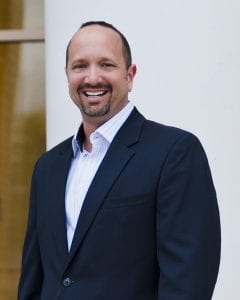
Randy Lawrence is known as a veteran real estate investor with decades of experience with single- and multi-family properties as well as a transformational community leader and church founder.
After receiving a degree in Finance with a minor in Economics, Randy began his career as a traditional wealth manager. Randy understands finance and investing strategies in the broadest sense. Randy previously held Series 7 and 65 licenses from the National Association of Securities Dealers as a Securities Dealer and Registered Investment Advisor. Randy worked in the Money Management sector for fifteen years and owned his own company which he sold in 2006. Ultimately Randy determined that real estate was the ideal investment vehicle for his own portfolio, and early on (over sixteen years ago), he began partnering with other investors, to their mutual benefit.
Today, Randy oversees a real estate portfolio of $160MM in multi-family assets and is on track to double these holdings in the next three years.
Love the show? Subscribe, rate, review, and share!
Join the Real Estate Investing for Women Community today:
To listen to the EXTRA portion of this show go to RealEstateInvestingForWomenExtra.com
To see this program in the video:
Search on Roku for Real Estate Investing 4 Women or go to this link: https://blissfulinvestor.com/biroku
On YouTube go to Real Estate Investing for Women
——————————————————
Learn how to create a consistent income stream by only working 5 hours a month the Blissful Investor Way.
Grab my FREE guide at http://www.BlissfulInvestor.com

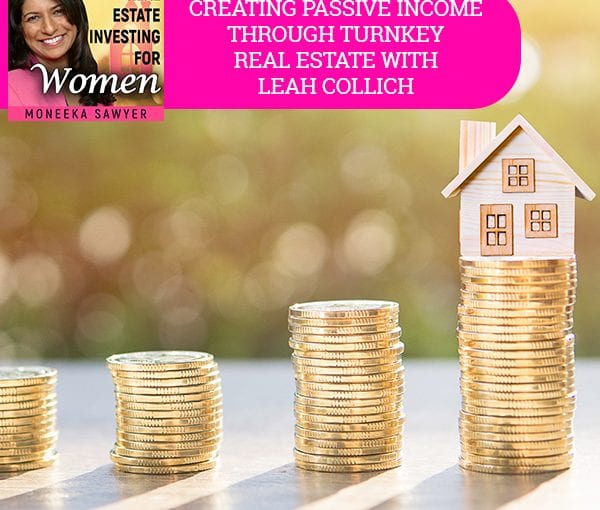
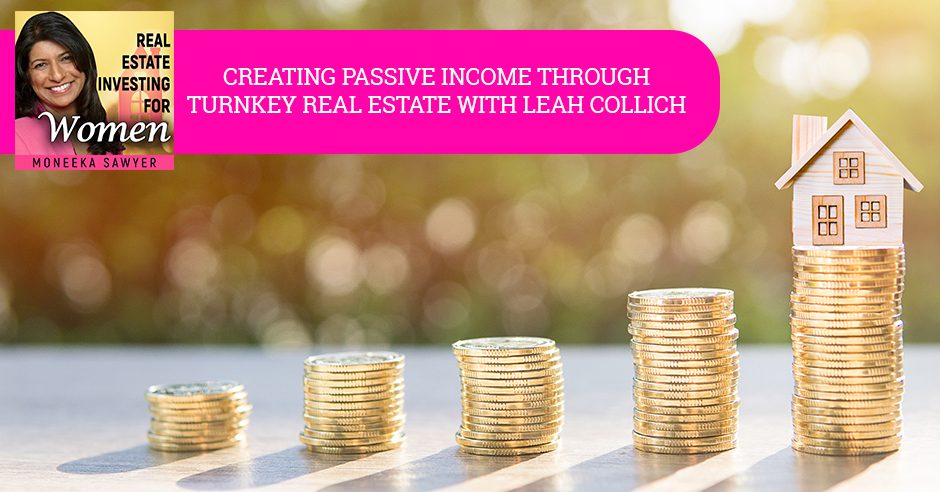







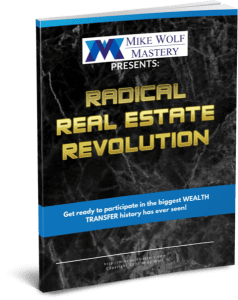
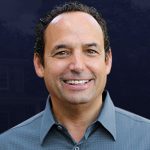 Mike Wolf is a self-made freedom lifestyle entrepreneur, multimillionaire investor, and international speaker.
Mike Wolf is a self-made freedom lifestyle entrepreneur, multimillionaire investor, and international speaker.